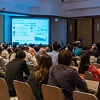By Joining you agree to MachPrinciple's Terms and Conditions and Privacy Policy
Click to Login
Please check your email. A registration confirmation link will be sent to your mailbox..
A registration confirmation link has been sent to your email. Please check your email and finish the registration process.

Search a Conference through our dedicated search page

The conference will focus on problems related to, or motivated by, representations of infinite dimensional Lie algebras and their quantum analogues. The recent rapid growth, rising prominence, and emerging connections between these topics underscores the timely need for a conference that focuses on new connections by bringing together leading researchers who work on different aspects of these subjects. A main goal of the conference is to expose graduate students and early-career researchers to recent developments in representation theory. In an effort to foster their interest and engagement, the four day conference will be preceded by a three day summer school/workshop for junior researchers. Infinite-dimensional Lie algebras and their quantum analogues play a prominent role in mathematics and mathematical physics. In recent decades their representation theory has been connected with a number of different subjects, such as algebraic geometry, algebraic topology, combinatorics and cluster algebras, to name but a few. The talks will focus on topics such as crystal and canonical bases, Weyl, Demazure and Kirillov-Reshetikhin modules and interaction between them, highest weight categories, Khovanov-Lauda-Rouquier algebras and their applications to categorification, cluster algebras and related structures, geometric methods in infinite dimensional representation theory (in particular, the role of quiver varieties), and map algebras. A special emphasis will be placed on interactions between various structures. The conference is funded by an NSF grant. Partial travel support is available, with the priority given to graduate students, postdocs and junior faculty, especially from liberal arts institutions, who have no other access to research funds. Women and persons from groups underrepresented in mathematical sciences are particularly encouraged to apply
